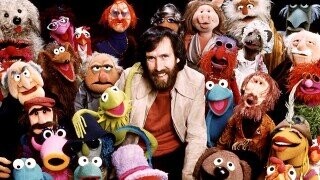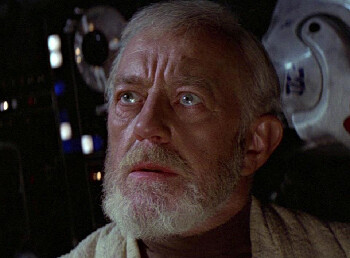5 Brilliant Creators Who Got Their Start Making Ordinary Ads

Like it or not, advertising is the grease in the wheels of the internet. It’s been a long time since “selling out” was seen as the ultimate sin, but you still hear complaints when people start taking sponsorships and marketing deals, even though that’s frequently the only way to make money doing something you love. Some people have the opposite trajectory, though – that is, starting in ads and then getting famous, such as …
Jim Henson
To talk about this, we have to strike a little bargain with you first: To most clearly tell you how this all went down, we’re not going to act like the Muppets are actual people, and in return you won’t get pissy about it. We’re not judging, whether or not you want to keep up the whole kayfabe thing, but just give us some time, deal? And you can deal -- you’re strong, you can spend a few minutes in the world where Kermit the Frog isn’t a real individual before you go back.

Now that we’re here, we can say that Jim Henson and all his many creations wouldn’t have gotten very far if he hadn’t used them in commercials. When a local TV station visited his high school’s puppet club, he was hired on the spot to join a kids show, then laid off three weeks later when the show was cancelled for violating child labor laws. While we’re making agreements here, can we agree that was a situation where cancel culture was not out of control?
Henson found more work quick, and spent the next few years refining his puppeteering on other, less child-endangering kids shows. He had big dreams of making puppets something people of all ages could enjoy, and that’s why he jumped at his chance when he was offered a gig making commercials for Wilkins Coffee. Coffee doesn’t advertise to kids (though they’ll probably put the Starbucks mermaid in Fortnite one of these days), and so Henson had free rein to make his prototype Muppets as violent and murderous as a big piece of felt with some googly eyes could be. As you can see, that kinda Kermit-ish one didn’t come to play:
Wilkins took a chance on Henson because they were a small company, but their ads ended up becoming a huge hit. Henson got plenty of advertising work thanks to the nationwide success of the coffee commercials, and he was able to turn that success into The Muppet Show, Sesame Street, and all the other beloved memories that we’ll let you go back to now.
F. Scott Fitzgerald
F. Scott Fitzgerald was a legit important writer. He dealt with stuff like the emptiness of consumer culture and the invisibility of mental illness and addiction, but he did it with stories about terrible rich people living the high life and then suffering, so you get it coming and going. All things considered, he probably deserved a better fate than becoming the guy who you’re forced to read in high school.

Scribner Books
But things could have been worse. Fitzgerald was just 23 when his hit first novel came out, but even he needed time before he found success. He started out with big dreams, but he was laughed out of all the serious newspapers and magazines he dreamed of writing for, and outside of writing his skillset largely consisted of simping. He needed to pay the bills, and so he picked up a job at an ad agency, writing slogans to go on streetcars and buses.
Fitzgerald never really cut a Don Draper-style figure, especially not as a kid barely (dropped) out of school, but he was noticed right away for his wit and zest. He was able to publish more personal work pretty fast, but not before he got a raise for figuring out a slogan for a laundry company in Muscatine, Iowa: “We keep you clean in Muscatine.” If that sounds simple and obvious, that’s because those are probably the best qualities an ad on the side of a trolley could have -- at least, before the invention of the uncomfortably pornographic pop-up ad.
Andy Warhol
Andy Warhol, the man who said “In the future everyone will be famous for fifteen minutes,” was clearly ahead of his time, though not enough to realize how much everyone would completely despise this situation. This galaxy-brain perspective made Warhol an enormous figure in culture and art, but it also means that today, decades after his death, he’s still in legal trouble over flat-out using other people’s work and calling it his.

Andy Warhol
That sums up a lot of Warhol’s work: He was the guy who painted soup cans and Marilyn Monroe and all the rest, but that’s because he was a provocative experimental artist who knew his shit better than anyone when it came to celebrity and popular media ... and because of that, knew he could get away with the soup cans and Marilyn Monroe instead of anything more complicated.
Everyone has to start somewhere, though: Warhol got his foot in the door as commercial illustrator who mostly did clothing ads in trendy New York magazines. He became well known in the ad world pretty quickly for his expressive, stylized work, which translated from art-school talk means “He didn’t draw stuff that looked real, but they looked cooler like that so it’s OK.”

Glamour Magazine
Through his long career, Warhol never really left the world of ads behind -- one of his last series of paintings was him carefully painting reproductions of popular commercials. But that’s just on brand for a guy who would probably love it if you told him “on brand” is something we say about people now, and then try to trademark the phrase himself.
But looking at the ads he drew, it’s pretty easy to see how Warhol ended up with the career that he did. After all, if you have to go to work every day and come up with new ways to make clothes look good, you get a lot of perspective on what makes something fashionable and memorable. And if you’re an artist but your drawings all look like that, repainting photographs and logos means the hard part is done for you.
Alec Guinness
The legendary British actor behind Obi-Wan Kenobi, who turned him into an icon long before the age of prequel memes, had a long and illustrious career before and after Star Wars. He did movies, TV, theatre -- but definitely not theater -- and did everything from winning an Oscar to playing nine characters in one movie.

General Film Distributors
Before all that, though, he was just a kid who needed to pay for acting school, and so once he got out of secondary school he landed a job as a copywriter with a local ad agency in London. We can’t tell you much about his work because he was at the bottom of the totem pole, and Guinness admits in his memoirs he got the job thanks to connections from school, and wasn’t much of a writer. Somehow, that didn’t stop him from writing an Oscar-nominated screenplay later in life -- like we say, an impressive career.

20th Century Fox
In those memoirs, he says he got a lot of experience with being an actual regular person thanks to the job, instead of taking the pipeline straight from being a student to being an actor, which playwright Tom Stoppard once called “the opposite of people.” To add to that, working in advertising gave him the instincts to make the deal that let Star Wars pay for his entire career afterwards, which probably took the edge off how much he despised it.
Salman Rushdie
Advertising about publicity, and Salman Rushdie doesn’t have the greatest track record in that department. There’s the old saying “all publicity is good publicity”, but try telling that to the guy whose publicity consists of an entire theocratic nation being ordered to murder him thanks to his novel The Satanic Verses. When you face regular state-supported assassination attempts, and get driven into hiding for years over a literary metaphor, then you probably lose a lot of love for the idea of comforting old sayings.
At more than a decade, Rushdie’s advertising career was longer than pretty much anyone else on this list. Years after publishing his first novel, he was still thinking up catchy slogans for one of the UK’s biggest advertising firms. He wrote in his off-time and worked two or three days a week, dealing with co-workers who called him “Salmon Fishcake.”
Luckily for the agency, he brought a similar level of imagination to the actual ads. Rushdie came up with successful slogans for everything from credit cards to newspapers to desserts. That last one was his biggest success: He came up with the first ad campaign for the Aero chocolate bar, which is an impressive way to dress up the fact that you’re selling less chocolate than normal for the same price.

Nestle
The long career fits perfectly here because his books are correspondingly longer, and completely unconcerned with anything you might expect from a guy who used to make ads. Midnight’s Children and The Satanic Verses aren’t exactly The Muppets Take Manhattan -- though that said, we wouldn’t turn down watching The Muppet Satanic Verses, with Sam The Eagle as the angel Gabriel.
Top image: The Muppet Studio